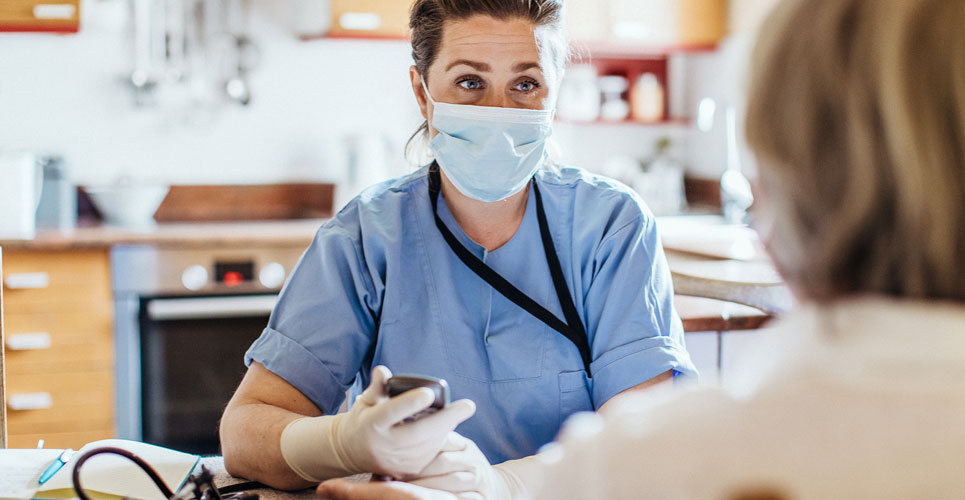In a study examining the clinical characteristics of over 5500 patients with COVID-19, it was found that uncontrolled diabetes was a significant mortality risk factor (hazard ratio = 2.36).1
However, what is more alarming is the notion that infection with COVID-19 might actually lead to the development of diabetes as had been reported recently in the media.2,3 But what is the evidence to support this premise and should patients without diabetes be unduly concerned?
The origins of the media stories are a letter written by a group of experts in the New England Journal of Medicine.4 The authors suggest that there is a bidirectional relationship between COVID-19 and diabetes. This is based firstly on the observation that having diabetes increases a patient’s risk of mortality (see reference 1) and secondly, the evidence that severe diabetic complications such as diabetic ketoacidosis and hyperosmolarity, requiring high dose of insulin, have been observed in patients infected with COVID-19.5-7
Although this would suggest that COVID-19 might cause diabetes, closer examination of the references cited by the authors reveals a very different picture. The first reference5 relates to a newly diagnosed diabetic patient who developed diabetic ketoacidosis after infection with COVID-19. The authors concluded that it was possible for COVID-19 to aggravate pancreatic beta cell function and cause diabetic ketoacidosis, that is, infection might worsen a problem that is likely to be experienced by someone with existing diabetes.
Both the second6 and third references7 include patients with existing diabetes although in reference 6, there were 42 patients developed ketosis, 27 of whom did not have diabetes. Ketosis refers to the production of ketones in the liver, leading to elevated levels of ketone bodies in the blood and is not necessarily related to diabetes.
In contrast, ketoacidosis is a severe metabolic disorder which is mostly seen in those with diabetes, although it can be induced in patients without diabetes such as those who have been fasting.8,9 Ketoacidosis occurred in five of the study patients, of which two did not have diabetes and the authors suggested that COVID-19 might accelerate fat breakdown and induce ketosis and subsequently ketoacidosis but called for further research to explore this association.
In the final study,7 the authors explored the association between the triglyceride and glucose index (TyG) and mortality in 151 patients of whom 25.8% were diabetic. While the results showed that the TyG was significantly associated with an increased risk of severe infection (with COVID-19) and mortality, there is no specific mention of diabetes and the authors simply concluded that the TyG index was higher in those with more severe infection and among those who died.
In summary, although media speculation implies that infection with COVID-19 is able to trigger diabetes, there is little currently no convincing evidence to support this claim. Nevertheless, an international group of diabetic researchers have established the CoviDiab registry10 project to try and establish the extent and characteristics of new-onset COVID-19-related diabetes and to determine its pathogenesis, management and outcomes.
Hopefully over time as the data contained in the registry is expanded, researchers will have a much clearer idea of whether there is an association between COVID-19 and the development of diabetes.
References
- The OpenSAFELY Collaborative. OpenSAFELY: factors associated with COVID-19-related hospital death in the linked electronic records of 17 million adult NHS patients. MedRxiv doi.org/10.1101/2020.05.06.20092999.
- The Telegraph. Covid-19 may trigger the onset of diabetes in previously healthy people. www.telegraph.co.uk/news/2020/06/12/covid-19-may-trigger-onset-diabetes-previously-healthy-people/.
- INDEPENDENT. Coronavirus may trigger diabetes in previously healthy people, scientists fear. www.independent.co.uk/news/health/coronavirus-diabetes-trigger-type-one-two-covid-19-a9564231.html.
- Rubino F et al. New-onset diabetes in Covid-19 [Letter]. N Engl J Med 2020; June 12 DOI: 10.1056/NEJMc2018688.
- Chee YJ, Ng SJ, Yeoh E. Diabetic ketoacidosis precipitated by Covid-19 in a patient with newly diagnosed diabetes mellitus. Diabetes Res Clin Pract 2020 April 24 [Epub ahead of print]
- Li J et al. COVID-19 infection may cause ketosis and ketoacidoisis. Diabetes Obes Metab 2020; April 20 [Epub ahead of print]
- Ren H et al. Association of the insulin resistance marker TyG index with the severity and mortality of COVID-19. Cardiovasc Diabetol 2020; 19: 58
- Larroumet A et al. Euglycemic ketoacidosis induced by therapeutic fasting in a non-diabetic. Nutrition 2020; Apr 72: 110668.
- Bonora BM, Avogaro A, Fadini GP. Euglycemic ketoacidosis. Curr Diab Rep 2020;20:25-32
- COVIDIAB Registry. https://covidiab.e-dendrite.com/.

